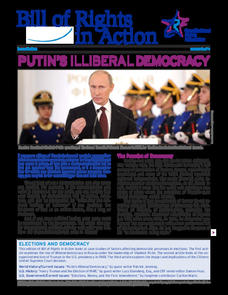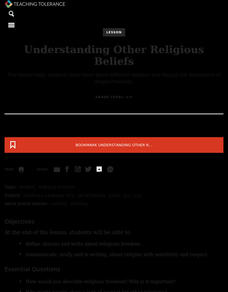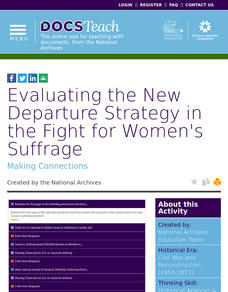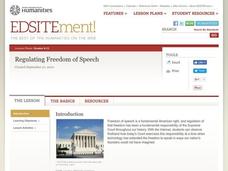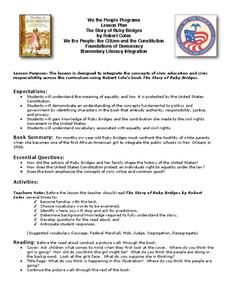DocsTeach
Election of 1800
The 2020 election is not the only unpredictable one in history. The Election of 1800 highlighted an unforeseen event in a presidential election. The activity reviews documents from the elections and what happened when the electoral...
Center for History Education
Nineteenth Century Reform Movements: Women's Rights
It's hard to imagine a world where women were marginalized from the seats of power. Yet, there are women today who remember what it was like to not be allowed to vote. Using a DBQ of images and other primary sources, such as political...
K20 LEARN
Oklahoma and Segregation
It was not just the states of the Deep South that practiced segregation. Young historians investigate the history of segregation and desegregation in Oklahoma. They begin by reading, annotating, and analyzing an article about the impacts...
Project Tahoe
Does the Use of Torture on Enemy Combatants Violate the 8th Amendment?
Tackle ethics in your high school history classes with a Socratic seminar about torture as a means for obtaining information. The plan allows for pupils to take the reins during the seminar. On the first day, class members read several...
National Constitution Center
AP English Language—Precision of Language
Say what you mean and mean what you say. The Precision of Language addresses the importance of words, especially when they concern a person's rights. Scholars take a look at many different examples and complete questions analyzing the...
National Endowment for the Humanities
The Declaration of Independence in Six Parts
Everyone knows that the Declaration of Independence is important, but what does it actually say? Members of American history classes analyze the Founding Fathers' arguments against British tyranny and for a more perfect union with a...
Curated OER
Post-1865: Effects of the War
An engaging lesson focuses on the impact of the war and Lincoln's plan for Reconstruction had on the United States. Historians analyze primary documents, such as Constitutional Amendments and newspaper experts. They also participate in...
Constitutional Rights Foundation
Putin's Illiberal Democracy
Is Russia really a democracy? High school scholars explore Russian democracy under the leadership of President Putin. The resource provides opportunity for group discussion, writing, and research to understand Russia's political history,...
Teaching Tolerance
Understanding Other Religious Beliefs
Learn what it means to respect others in an engaging lesson plan on religious beliefs. An inclusive resource focuses on understanding other religious beliefs, the right to freedom of religion, and the U.S. history of religious diversity....
DocsTeach
Evaluating the New Departure Strategy in the Fight for Women's Suffrage
When women demanded their right to vote, did the Constitution already protect it? The New Departure Strategy in the women's suffrage movement made this claim through court hearings. Using documents, such as transcripts from Susan B....
Museum of the American Revolution
Hamilton Was Here: Rising Up in Revolutionary Philadelphia
Hamilton may be a hit Broadway show, but there is so much more to learn. An eight-unit resource guides young historians through the life of Alexander Hamilton and the Revolutionary War. The lessons include hands-on-activities, writing,...
Curated OER
African American Women Trailblazers
Students take a closer look at the accomplishments of African-American women. In this African-American history lesson, students explore the work of Bessie Coleman, Gwendolyn Bennett, Lulu Madison White, and Zelma Watson George as they...
Curated OER
The Alien and Sedition Acts
Students discover the conflicts that arose between the political parties over issues of foreign policy and economics. Using the Internet, they research the Alien and Sedition Acts and how they relate to the U.S. Constitution. They...
Curated OER
Building the State (1781-1797)
In this online interactive history activity, students respond to 9 short answer and essay questions about the vision of the Republicans and the Federalists.
Curated OER
Why Do We Separate Power?
Students investigate the separation of powers that are outlined in the Constitution. The lesson includes essential questions that are used to guide the research. The information is used to increase knowledge of how power is used in...
Heritage Foundation
The Senate
Do your learners struggle to understand the differences between the Senate and the House of Representatives? Help them develop an understanding of how the US Constitution's clauses affect the Senate's operations. A high-quality...
Curated OER
Legal Rights, the Charter, and Canada's Constitution
Students explore the issue of human rights in Canada and compare and contrast the Bill of Rights and the Charter of Rights and Freedoms. They debate whether Canadians are giving up certain democratic rights in exchange for the greater good.
Curated OER
Giving Voice to History
Learners examine the plight of Japanese Americans during World War II. In this World War II instructional activity, students participate in a mock evocation simulation, research primary and secondary documents about internment camps, and...
Curated OER
Regulating Freedom of Speech
High schoolers examine the nature and limits of the Constitutional right to freedom of speech. They read and analyze the First Amendment, discuss various case studies, and research and record their own opinion on discussion questions.
Curated OER
Symbolic Speech
Ninth graders consider the right of freedom of speech as it is outlined in the U.S. Constitution. They receive background information for the US Supreme Court, the Bill of Rights, and free speech. They discuss a series of actual cases...
Curated OER
A Lesson To Accompany "The First Bank of the United States: A Chapter in the History of Central Banking"
Here is an interesting topic. Learners examine the economics that led to the founding of the First Bank of America. They participate in a reader's theater experience depicting the debate between Alexander Hamilton and Thomas Jefferson...
Curated OER
American History Through the Len of the Supreme Court Decisions
Students examine the historical background of Supreme Court decisions and the basic principles behind legislation. As part of the lesson, students discover legal concepts and terms and write sentences using the vocabulary they have...
National Constitution Center
Thirteenth Amendment Poster
President Lincoln believed in the Thirteenth Amendment so strongly that he signed 14 copies of it, but died before he could see it passed on December 18, 1965. Explore the text that forever abolished slavery in America with a document...
Curated OER
We the People: The Citizen and the Constitution
Robert Coles’ The Story of Ruby Bridges forms the basis of this powerful cross-curricular study of civic education and civic responsibility. Class members consider how the book presents authority, responsibility, justice, and privacy.....
Other popular searches
- Constitution History Outline
- The Constitution History
- Canada Constitution History
- Us History Constitution
- U.s. History Constitution









